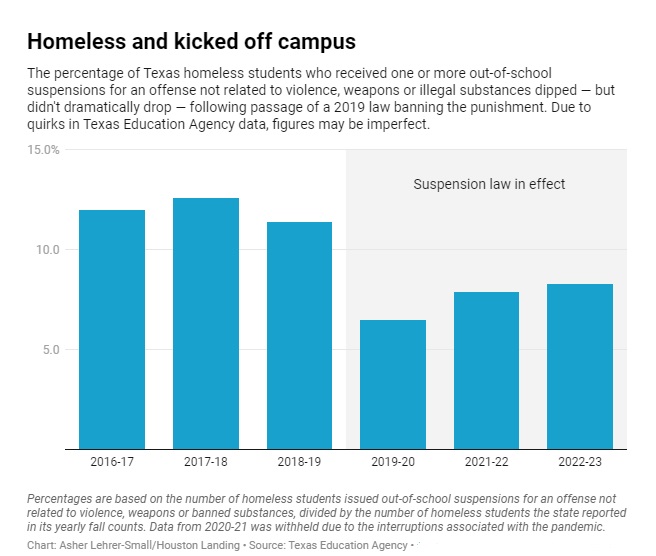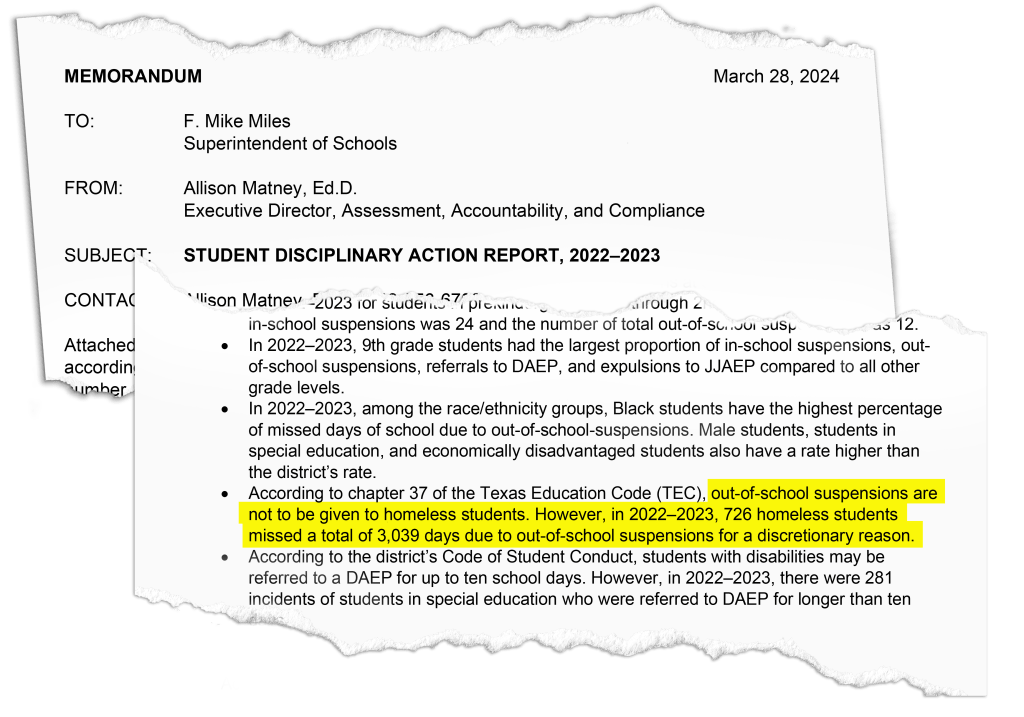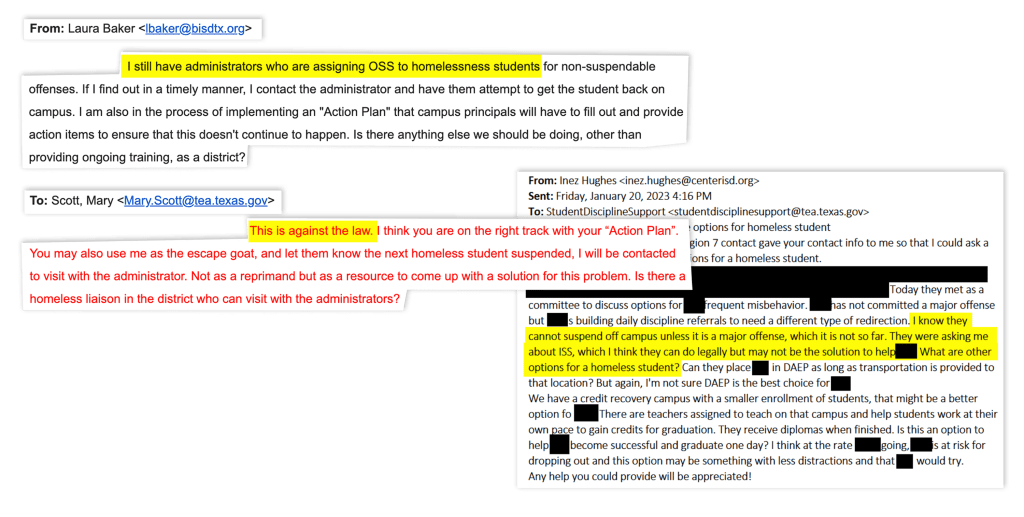Texas schools illegally suspended thousands of homeless students—and nobody stopped them

Danielle Stephen, 20, participates in a Christian service May 8 in Houston's Montrose neighborhood. Stephen, who was kicked off campus and into the streets as a high school student, attended the outdoor service to support people struggling with homelessness. Marie D. De Jesús / Houston Landing

Connecting state and local government leaders
Hundreds of districts have illegally suspended students over the past five years, according to data obtained from the Texas Education Agency, denying students access to the food, shelter and education often found only on campus.
This article first appeared as an exclusive on Houston Landing and is republished here under a Creative Commons license.
Channelview High School senior Danielle Stephen trudged out of the assistant principal’s office, defeated and desperate.
In the fall of 2021, an administrator at the east Harris County campus had just suspended Stephen, sending her home for breaking a rule requiring students to carry backpacks made of see-through material.
But Stephen, who had lived on the streets for much of the past three years, didn’t have a home to go to. The 100-liter camouflage hiking backpack that got her kicked off campus held all her possessions. And she would now miss lunch at school, the place she relied on for hot meals.
“That was my way of showering,” Stephen said. “That was my way of eating.”
Stephen was one of thousands of homeless students banned from school despite the passage of a 2019 state law that made it illegal for school administrators to kick Texas’ most vulnerable children off campus for most offenses, a Houston Landing investigation shows.
School employees in hundreds of districts have illegally suspended students over the past five years, according to data obtained from the Texas Education Agency, denying students access to the food, shelter and education often found only on campus.
Texas lawmakers took those concerns into account when they crafted the bipartisan 2019 law, which bans schools from issuing out-of-school suspensions to homeless students, except for when they commit infractions that include violence, weapons, drugs or alcohol. The law passed with over 95 percent support in the Texas Legislature and the backing of Gov. Greg Abbott.
But a Landing analysis of public records and five years’ worth of suspension data found:
- The illegal suspensions have continued largely because school leaders have failed to ensure their campus administrators follow the law. Houston ISD, the state’s largest district, has acknowledged breaking the law on hundreds of occasions in its annual reports on school discipline.
- Texas legislators did not give the 2019 law teeth, such as punishment for school employees or districts that violate it, or dedicate any money toward enforcement.
- Meanwhile, the Texas Education Agency has not taken an active role in enforcing the law, largely arguing it doesn’t have the legal authority to investigate and punish districts. The agency also has held few training sessions that inform school employees about the rules.
- A quirk in Texas’ data tracking of homeless students and suspensions makes it impossible to measure the exact number of illegal suspensions and pinpoint which districts are the worst offenders.
When presented with the Landing’s findings, one of the 2019 bill’s co-sponsors, state Rep. Eugene Wu, D-Houston, said the Legislature should make changes to the law when lawmakers return to session next year. Wu said the Legislature “laid out clear direction in the law” but left out enforcement measures, allowing districts to skirt it without consequences.
“If we need to make revisions to the law to force compliance, we will,” Wu said.
TEA spokesperson Jake Kobersky said the agency is “conducting a thorough review” of the suspension data for homeless students in response to issues highlighted by the Landing. The review may prompt further state oversight of districts not in compliance, Kobersky said.
And several Houston-area school districts and charter school networks, including HISD and International Leadership of Texas, committed to improving their compliance with the law and support of homeless students in response to inquiries from the Landing.
A Well-Intentioned Law
Texas lawmakers stressed the need for the 2019 bill, in part, by highlighting the perils faced by the state’s tens of thousands of homeless children, who historically have made up roughly 1.5 percent of all K-12 students.
Children experiencing homelessness drop out of school more frequently than nearly any other student group in Texas, state data shows. Research from the National Sexual Violence Resource Center also found 1 in 3 youth report being solicited into prostitution or human trafficking within 48 hours on the street.
Stephen faced those dangers when she became homeless at the end of eighth grade. That spring, she left an adoptive family that she said abused and neglected her, ultimately drifting between bus stops, parking lots and friends’ couches.
“I’ve stayed with so many people, I can’t count,” Stephen said. “But they started expecting things from me, you know, money, sexual favors. So, I had to leave.”
In high school, Stephen found refuge on campus. It was where she showered in the morning, ate two hot meals and joined after-school clubs like the Junior Reserve Officer Training Corps.
Yet Stephen said Channelview officials suspended her several times, often sending her home in the middle of the school day. (Stephen’s student records show three instances of formal discipline, with no out-of-school suspensions. Channelview officials disputed Stephen’s recollection of her discipline history, though they declined to comment in detail, citing privacy rules.)
The experiences of students like Stephen inspired progressive and conservative groups in 2019 to call for change. The former emphasized that vulnerable youth should keep access to campus resources, while the latter called for limiting harmful government overreach.
“If they're homeless, where are they going?” former state Rep. James White, an East Texas Republican and ex-educator who co-sponsored the bill, said in a late March interview. “We could be making the situation less safe and more dangerous for some folks.”
Incomplete Implementation
For Prince Hayward, a formerly homeless student, the bill’s passage felt like a huge win — at first.
While living in a homeless shelter in the early 2010s, Hayward dropped out of HISD’s Lamar High School following a three-day suspension for fighting. The experience helped him understand the stakes of the new law, which passed while he worked as a policy specialist for the nonprofit Texas Network of Youth Services.
But today, Hayward, now 28, wonders if he celebrated the 2019 law too early, given that many of Texas’ largest school districts continue to issue the outlawed suspensions.
The available TEA data show out-of-school suspensions issued to homeless students for minor offenses now occur at about two-thirds the rate they did before the law — well short of eliminating the practice as lawmakers intended.
“In essence, that’s like, the school district is literally spitting in the law’s face,” Hayward said.

The full extent of Texas’ failure to follow the law isn’t clear, largely because of how the state collects data on homeless students and suspensions.
Texas classifies a student as homeless if they spent any amount of time during the school year without housing. As a result, it’s possible some students were legally suspended at a time when they had housing, yet their suspensions would appear in the data as illegal if they later became homeless. (For this reason, the Landing decided to only publish broad state-level data, which is also an imperfect count of illegal suspensions.)
It’s also possible that district employees suspended students who were not listed as homeless, yet who lacked stable housing. Those suspensions are still illegal, yet they wouldn’t show up in the state data.
“(Young people) who are experiencing homelessness are often hiding in plain sight,” said Felicia Broussard, chief development officer for the Houston-based youth shelter Covenant House. “You wouldn't recognize them as homeless, and that's intentional because they know they're vulnerable.”
No Excuse
Several local school leaders acknowledged in recent interviews that their districts made insufficient effort to comply with the law.
Some said their districts crammed information about the 2019 law into beginning-of-year training slideshows at the time, with no follow-up. Others didn’t implement technological changes that would flag when staff members tried to illegally suspend a homeless student.

International Leadership of Texas Superintendent Eddie Conger said there’s “no excuse” for his charter school network continuing to illegally suspend homeless students. Conger said campus leaders were briefly informed that they shouldn’t kick out homeless students for minor offenses, but he guessed that the message got buried in hours-long presentations before the start of the school year.
“There’s not a doubt in my mind that we’ve briefed this,” Conger said. “But for that week of training, it’s a fire-hose effect.”
Conger said he plans to make changes to the district’s internal data systems, so that administrators’ computers produce error messages when they try to log illegal suspensions of homeless students.
Aldine Independent School District made a technical change similar to the one Conger suggested after the law went into effect, Assistant Superintendent of Student Support Diaka Melendez said. The state data suggests the change helped — but didn’t eliminate — Aldine’s use of illegal suspensions.
“We have multiple safeguards in place,” Melendez said. “We’re very diligent about making sure that we do not do that level of suspension.”
No State Sanctions
Minimal state oversight and scant guidance from the Texas education officials has played a part in the continued use of illegal suspensions, according to records obtained by the Landing and interviews with district and political leaders.
Despite the repeated violations, the TEA has not sanctioned any districts that broke the rules, according to the agency.
Kobersky, the TEA spokesperson, said the new law didn’t give agency staff the legal right to collect the precise data needed to prove districts were illegally suspending homeless students. Kobersky added that the agency can launch an investigation into misconduct allegations, but only in response to complaints from the public.
The law related to school district investigations doesn’t list excessive or illegal suspensions as a reason for TEA to launch a probe, but it does give the state’s education commissioner — who leads the TEA — broad power to start an investigation when they determine “necessary.”
TEA staff also have largely left training on the law to regional and district administrators. Since 2019, the TEA has held only two training sessions that inform K-12 staff of the law’s provisions, with a more than three-year gap between the bill’s passage and the first session held by the state.
Kobersky said he would “push back” on the idea that the TEA has provided inadequate education around the law’s provisions. Schools’ homeless liaisons have access to “robust” training from the state, but the agency does not have the legal authority to require K-12 staff to participate in the sessions, he said. Regional officials have also held separate training opportunities for districts’ homeless liaisons, Kobersky said.
The Landing requested a list of district staff who participated in TEA-held trainings, but the agency said it did not take attendance.
‘It’s Just Words’
The lack of emphasis on training and rollout puzzles Courtney Sellers, who works with dozens of homeless youth as executive director of Houston’s Montrose Grace Place.
“Once you pass a law, you have to implement it. You should definitely go in and make sure it’s happening,” Sellers said. “Otherwise, it’s just words.”
Even districts that were mindful of the law at times struggled to follow it, administrators’ emails with the TEA reveal.
For example, Bastrop Independent School District Director of Student Services Laura Baker emailed TEA officials in 2019, asking for advice on how to stop administrators in her Austin-area district from continuing to issue illegal suspensions.
“If I find out in a timely manner, I contact the administrator and have them attempt to get the student back on campus,” Baker wrote. “Is there anything else we should be doing, other than providing ongoing training, as a district?
TEA Student Discipline Specialist Mary Scott responded by suggesting Baker refer administrators who issue the illegal suspensions to her, “not as a reprimand but as a resource to come up with a solution for this problem.” Scott did not suggest structural changes to the districts’ internal discipline tracking systems.

Looking Ahead
Children’s advocates hope that with renewed scrutiny and support, school districts can do more to protect the homeless students they serve.
Brett Merfish, who pushed for the 2019 bill as director of youth justice for the Austin-based nonprofit Texas Appleseed, said she believes the pandemic overwhelmed districts and distracted from the rollout of the suspension law.
Merfish also said school leaders need more guidance on how to respond to homeless students who act out in class, she said. Finding ways to keep disruptive students in school — rather than kicking them off campus — can be challenging and expensive for districts.
“My gut isn’t that people don’t want to do this,” Merfish said of following the 2019 law. “I just think they probably don’t know what else to do, sometimes.”
Hayward, the former Texas Network of Youth Services policy specialist, argued it’s time for state leaders to revisit the 2019 law. Educators should attend mandatory training sessions on its provisions and the state should punish districts that don’t comply, he said. Hayward also said schools need more staff to help homeless students process the traumas they experience on the streets.
“I feel like you need some type of accountability,” Hayward said. “Whatever that looks like, something needs to happen behind it.”
Asher Lehrer-Small covers education for the Landing and would love to hear your tips, questions and story ideas about Houston ISD. Reach him at asher@houstonlanding.org.

NEXT STORY: Amid record high NYC homeless student population, calls grow for laundry machines in schools





